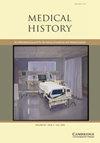The penetration of financial capital and the growth of private hospital groups in Europe: the case of Spain (1975–2022)
IF 1.1
2区 哲学
Q4 HEALTH CARE SCIENCES & SERVICES
引用次数: 0
Abstract
Abstract From the last decades of the twentieth century, above all, in the more service-oriented post-industrial economies, and in a context of debilitation of public health systems, health care became exponentially profitable, thereby attracting new types of investors. In fact, this new stage entails moving from the commercialisation of health care to its financialisation; that is, medical care becomes just one more financial asset and its price and quality are quoted on the stock exchange. This study intends to participate in the debate initiated by historians of medicine and economic historians with the aim of tracing capitalist traits and market participation in the evolution of health coverage, a process initially promoted by professional doctors who converted their consulting rooms into small clinics and larger hospital companies and which, over time, saw the incorporation of financial capital. In particular, this paper has two specific objectives for the case of Spain. First, to analyse the relationship of collaboration and/or competition between public and private hospitals under democracy and the factors that have conditioned this relationship. Second, to make an initial contribution towards understanding how, in this context, the large private hospital groups have been created in Spain during this period, especially in recent decades with concentration in the hands of financial capital, originating from both the traditional banking sector and investment funds.欧洲金融资本的渗透与私立医院集团的增长:以西班牙为例(1975-2022)
从20世纪的最后几十年开始,首先,在以服务为导向的后工业经济中,在公共卫生系统衰弱的背景下,医疗保健变得指数级盈利,从而吸引了新型投资者。事实上,这个新阶段需要从医疗保健的商业化转向其金融化;也就是说,医疗保健变成了另一种金融资产,其价格和质量在证券交易所报价。本研究打算参与由医学历史学家和经济历史学家发起的辩论,其目的是追踪资本主义特征和市场参与健康覆盖的演变,这一过程最初是由专业医生推动的,他们将诊室转变为小型诊所和大型医院公司,随着时间的推移,金融资本的加入。特别是,本文对西班牙的案例有两个具体目标。首先,分析民主制度下公立医院和私立医院之间的合作和/或竞争关系,以及制约这种关系的因素。第二,初步了解在这一背景下,西班牙在这一时期,特别是近几十年来如何建立了大型私人医院集团,这些集团集中在来自传统银行部门和投资基金的金融资本手中。
本文章由计算机程序翻译,如有差异,请以英文原文为准。
求助全文
约1分钟内获得全文
求助全文
来源期刊

Medical History
医学-科学史与科学哲学
CiteScore
1.60
自引率
0.00%
发文量
25
审稿时长
>12 weeks
期刊介绍:
Medical History is a refereed journal devoted to all aspects of the history of medicine and health, with the goal of broadening and deepening the understanding of the field, in the widest sense, by historical studies of the highest quality. It is also the journal of the European Association for the History of Medicine and Health. The membership of the Editorial Board, which includes senior members of the EAHMH, reflects the commitment to the finest international standards in refereeing of submitted papers and the reviewing of books. The journal publishes in English, but welcomes submissions from scholars for whom English is not a first language; language and copy-editing assistance will be provided wherever possible.
 求助内容:
求助内容: 应助结果提醒方式:
应助结果提醒方式:


